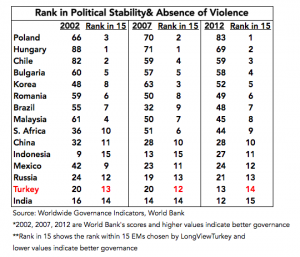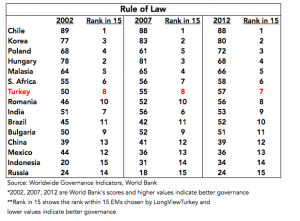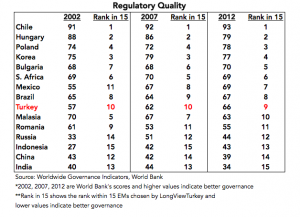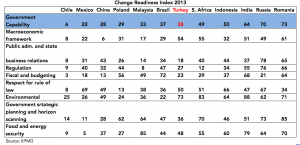DataTurkey: Governance
- Posted by Pelin Dilek
- Posted on October 23, 2013
- Data&Charts
- Comments Off on DataTurkey: Governance
- Governance indicators aim to reflect the capabilities and gaps of national governments in formulating and implementing sound policies. Indices listed here from World Bank’s ‘WorldWide Governance Report’ and KPMG’s Change for Readiness 2013.
- World Bank’s ‘Worldwide Governance indicators report six broad dimensions of governance for 215 countries. According to the definition given by World Bank, ‘voice & accountability’ captures perceptions to the extent to which a country’s citizens are able to participate in selecting their government, as well as freedom of expression, freedom of association, and a free media.
- Turkey ranks 12th in ‘voice & accountability’ among the 15 Emerging Markets chosen. Turkey’s ranking was almost unchanged in the past ten years, both compared to 15 emerging markets and compared to World Bank’s wider set of countries.
- Political stability and absence of violence measures perceptions of the likelihood that the government will be destabilised or overthrown by unconstitutional or violent means. Among the 15 emerging markets, Turkey’s ranking deteriorated in 2012 compared to the previous year.
- Among the six indicators of ‘Worldwide Governance’, Turkey improved the most in control of corruption in the past ten years.
- In terms of government effectiveness, Turkey ranks 6th among the 15 Ems, improving compared to ten years ago.
- Turkey ranks 7th in rule of law and 9th in regulatory quality among the 15 EMs we chose.
- According to KPMG’s Change for Readiness Index 2013, Turkey’s government capability ranks 38th among the 90 countries. Turkey ranks the best in public administration and business sector relations; and the worst in environmental subcategory.
Post Tagged with Turkey corruption, Turkey governance indicators, Turkey regulatory quality, Turkey rule of law
- March 2023
- February 2023
- September 2022
- April 2022
- February 2021
- June 2020
- March 2020
- December 2019
- November 2019
- June 2019
- May 2019
- March 2019
- February 2019
- October 2018
- August 2017
- June 2017
- February 2016
- October 2015
- May 2015
- March 2015
- January 2015
- December 2014
- September 2014
- April 2014
- January 2014
- December 2013
- November 2013
- October 2013
- September 2013
- July 2013
- May 2013
- April 2013







